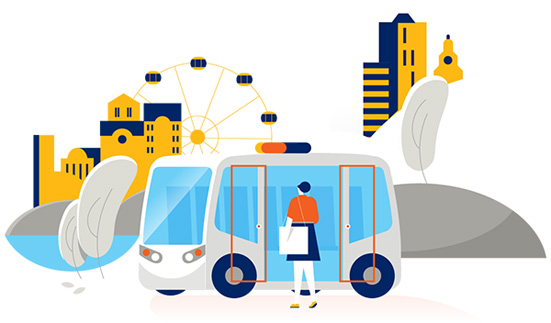Consortia to pilot autonomous shuttles in five cities
- February 4, 2020
- imc

Three consortia will pilot self-driving shuttles as part of regular traffic in five European cities between April and October this year as part of the EU-funded Fabulos project.
The Fabulos procuring partners have awarded three international consortia with contracts for the final phase of the pre-commercial procurement. These consortia will pilot autonomous buses as part of existing public transport systems, and the fleets of three buses each will be piloted in Gjesdal, Helmond, Helsinki, Lamia and Tallinn.
Fabulos is a three-step pre-commercial procurement (PCP) project that aims to deliver a proof-of-concept for automated last-kilometre public transport as part of the existing transport system. In the first phase of the PCP, the five consortia chosen for this phase developed a concept and system architecture capable of operating autonomous buses.
During the second phase of the PCP, the four consortia successful in progressing to this phase developed prototypes based on their shuttle service. All the consortia were successful in the prototyping phase and received full compensation for their work.
The ambitious goal of the third phase of the PCP is to verify and compare the prototypes in real-life conditions. Based on an assessment by the Technical Evaluation Committee and the external evaluator panel, three consortia were invited to partake in this final phase:
- The Sensible 4-Shotl Consortium comprising two partners: Sensible 4 from Finland and Shotl from Spain. The consortium is using the automated Gacha bus from Sensible 4 and Muji.
- The Mobile Civitatem Consortium comprising four Estonian partners: Modern Mobility, Tallinn University of Technology, AuVeTech and Fleet Complete. This consortium is building and testing its own autonomous vehicle – Iseauto.
- The Saga Consortium comprising four partners: Halogen, Forus PRT and Ramboll Management Consulting from Norway with Spare Labs from Canada. The consortium will work with one of the established European shuttle manufacturers.
In the third phase, the consortia receive up to €740,000 to validate their prototypes, prepare pilots and implement operational systems.
During the piloting period, three different holistic autonomous shuttle services will be tested in five European cities. The pilots will first run in Gjesdal in Norway, Helsinki in Finland and Tallinn in Estonia in the spring. During autumn 2020, pilots will be launched in Lamia in Greece and Helmond in the Netherlands.
During the six-month field trials, the functionality, interoperability and security of the autonomous fleets will be assessed. All the pilots will take place in urban settings, but each pilot location has its own problems.
In Gjesdal, there is a 12% incline due to the mountainous terrain, whereas in Lamia high temperatures must be successfully managed. In the Netherlands, the large number of cyclists must be taken into consideration and in Helsinki the route passes the second busiest train station in the country. In Tallinn, the connection to the airport will be improved, leading to challenges with factors such as existing bus traffic.
In all locations, the shuttle services will be tested to ensure the functionality of remote operability from the control room. Furthermore, the buses must be able to overtake obstacles such as parked cars autonomously. The shuttles are expected to be driverless, and a safety person will only be allowed on board if local regulations require this.
The overall aim of the Fabulos pre-commercial procurement is to accelerate the introduction of types of automated last-kilometre services entering the European market. Therefore, when the pilots have been finalised, the procuring cities and preferred partners will initiate a public procurement of innovation. This follow-up procurement will be a topic of discussion during the Fabuolos final conference, which will take place in November 2020 in Helsinki.
Fabulos is an acronym of “future automated bus urban level operation system”, and is a research and development project that seeks to establish and deliver a systemic proof-of-concept for automated last-kilometre public transport as part of the existing transport system of urban areas, based on the use of self-driving minibuses.
The project has received funding from the European Union’s Horizon 2020 research and innovation programme and ran from January 2018 and is due to finish at the end of this year. The project has partners in Estonia, Finland, Greece, Netherlands, Norway and Portugal.




